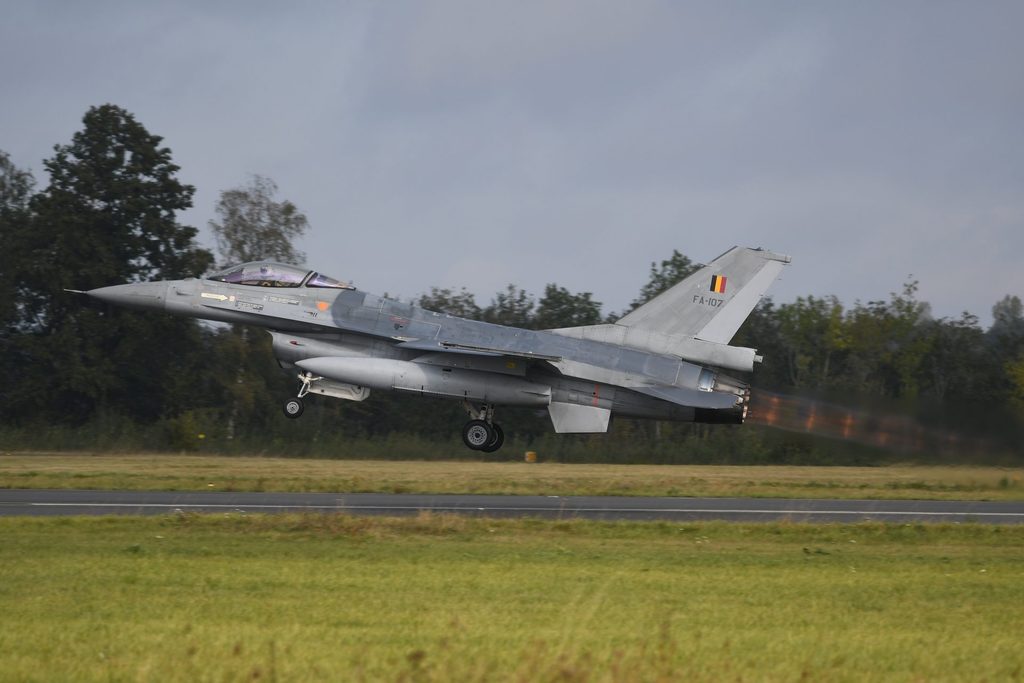A military expert has claimed that Belgium is not sending F-16 fighter planes to Kyiv over fears their provision would make the country a direct participant in Ukraine's ongoing war with Russia – on top of the fact Belgium has few jets to spare.
Back in February, Prime Minister Alexander De Croo announced that Belgium would not send its own F-16s to Ukraine, as it requires them to run training missions and meet its obligations as a NATO member.
"This spring, the Belgian government already decided not to supply combat aircraft. Then, there was a lot of fear of escalation: remember the discussions around the supply of tanks," former Belgian Army Colonel Roger Housen told Gazet van Antwerpen.
"Belgium is not a warring party and does not want to become one. That is why our country remains remarkably silent about the supply of war material, he said, adding: "We need a number of F-16s for the surveillance of our airspace and for NATO missions, such as the protection of the Baltic states."
Housen's comments echo previous remarks by De Croo. "We fully support Ukraine in its war against Russia but we must not become a party ourselves," the Belgian leader said at a recent NATO Summit in Vilnius. "We ourselves are not at war with Russia."
The cabinet of De Croo reconfirmed in May that Belgium would not be supplying aircraft to Ukraine, but stated that the country is willing to train Ukrainian fighter pilots to fly F-16s if provided by other countries.
'More complex than it seems'
Housen also emphasised that Denmark and the Netherlands' recent decision to send F-16s to Ukraine (which followed the US's decision to greenlight their re-export) was largely a consequence of the fact that neither country requires the aircraft for their own defence.
The Netherlands and Denmark are taking the lead in the so-called 'jet fighter coalition' of 11 NATO countries. Not coincidentally, because both Member States are already very far in the rollout of the brand new F-35.
"[The Netherlands and Denmark] have already withdrawn F-16s from circulation, while our country will only begin to do this next year," he said. "For comparison: the Netherlands entered the F-35 programme in the late 90s, but in Belgium the decision was made only in 2018. It's not just about political unwillingness."
Housen also expressed scepticism as to whether Kyiv's acquisition of F-16s would by itself significantly alter the current battlefield dynamics in Ukraine.
"People might think: you have a pilot and a good plane, then we are good," he said. "Nothing could be further from the truth. These aircraft are extremely high-performance, but need a good framework if they want to play a role on the battlefield."
Related News
- 'We ourselves are not at war with Russia': De Croo distances Belgium from Ukraine war
- First F-35 fight jet being assembled to be transported to Belgium
- Belgium willing to train Ukrainian pilots to fly F-16s
In addition to the aircraft themselves, Housen noted that F-16s require extensive aerial refuelling as well as advanced maintenance and repair systems. He also claimed that just a handful of Ukrainian pilots currently know enough English to be able to learn how to fly the aircraft.
"There are only eight [pilots] in the whole country who know enough English for F-16 training," he said. "They will have to struggle through fist-thick manuals written in very technical jargon." However, this month the first 20 Ukrainian pilots are currently undergoing F-16 training in the UK.
Housen added that, with the aircraft only likely to be operational "by Easter next year at the earliest", they are unlikely to have any beneficial impact on Ukraine's counteroffensive.
"It takes a lot of time to train Ukrainian pilots, who are used to flying around with old MiGs," he said. "It's all much more complex than it seems."

